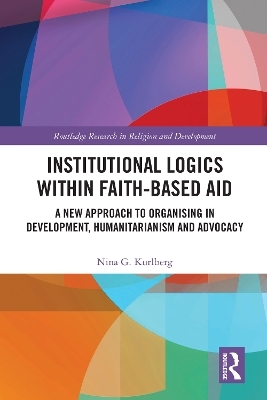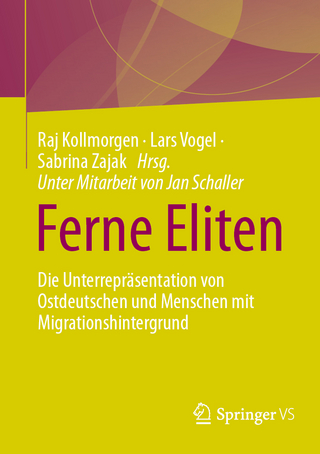
Institutional Logics within Faith-Based Aid
Routledge (Verlag)
978-1-032-77008-6 (ISBN)
- Lieferbar (Termin unbekannt)
- Versandkostenfrei innerhalb Deutschlands
- Auch auf Rechnung
- Verfügbarkeit in der Filiale vor Ort prüfen
- Artikel merken
Faith-based organisations play an extremely prominent role in international aid and development, operating within the same sphere as organisations without an explicit religious affiliation. This book uses the case study of a UK-based Christian faith-based organisation to develop an analytic tool using institutional logics. Through exploration of how various institutional logics are manifested and negotiated across organisational practice, the book describes how the ‘telos,’ or objective, of the corporate logic (to sustain the organisation) interacts with the telos of the religious logic (namely, to worship God). The book demonstrates that since organisational practices must ultimately work to sustain the organisation, at the organisational level faith is restricted to certain spaces and forms, while at the individual level faith is dominant and active.
Bringing a fresh perspective to discussions of religion and development by highlighting how faith influences development at the organisational level, this book will be an important read for researchers working on global development.
Nina G. Kurlberg is a Postdoctoral Research Associate at Durham University. In her PhD (University of Edinburgh, 2023), she used the lens of institutional logics to explore what the faith orientation of faith-based organisations means in actual practice. Nina has worked within the international development sector for nearly a decade, both in the UK and Sri Lanka. Most recently, she worked for Tearfund – a Christian relief, development, and advocacy organisation – developing theology in the area of diversity and inclusion (D&I). Together with Dr Madleina Daehnhardt, Nina is co-editor of Theologies and Practices of Inclusion and Disability Inclusion in Africa.
Table of Contents
Introduction
Faith-Based Organisations (FBOs)
A) FBOs within religions and development
B) Understanding and researching FBOs
Roadmap to the Institutional Logics Perspective
A) A critique of the existing frameworks
B) The Institutional Logics Perspective
Overview of the Book
A) Structure
B) Defining Key Terms
1. The institutional Logics Perspective in Research
Theoretical Framework
A) The institutional logics perspective
B) Theoretical contribution of the book
The Significance of the Field
A) The field and the institutional logics perspective
B) The field and FBOs
Empirical Research
A) Developing a field-level typology of logics
B) Methods of data collection
Conclusion
2. Institutional Logics within the Practice of Aid
The Historical Roots of the Practice of Aid
A) The emergence of development
B) The emergence of humanitarianism
C) The emergence of ‘long-distance advocacy’
The Practice of Aid Post-WWII
Conclusion
3. Institutional Logics within the Field
Constructing a Field-Level Typology of Logics
A) Identifying a suitable sub-component of the field
B) The process
The Typology of Logics
A) The logics
B) The categories
Conclusion
4. Institutional Logics within a UK-Based FBO
Data Collection and Processing
A) Data collection
B) Method for processing the data
Data Analysis
A) Logics at the organisational level according to the typology
Conclusion
5. Christian Organising through the Lens of Institutional Logics
What institutional logics are in force and how are they manifested within the organisation?
A) The logic of long-term sustainability
B) The logic of impact
C) The logic of participation and consensus-building
D) The logic of pastoral care and support
How do individual actors negotiate these logics on a daily basis?
What roles does the logic of religion play and how does it interact with other institutional logics?
What does the faith orientation of FBOs mean in practice?
A) What questions is the FBO asking in this regard?
B) How does faith actually influence organisational practice?
Conclusion
Conclusion
Summary of argument
Contribution of the book
A) Contribution to the study of FBOs in religions and development
B) Contribution to the institutional logics perspective
What next?
Bibliography
Acknowledgements
Index
| Erscheinungsdatum | 10.07.2024 |
|---|---|
| Reihe/Serie | Routledge Research in Religion and Development |
| Zusatzinfo | 22 Tables, black and white; 6 Halftones, black and white; 6 Illustrations, black and white |
| Verlagsort | London |
| Sprache | englisch |
| Maße | 156 x 234 mm |
| Themenwelt | Sozialwissenschaften ► Soziologie ► Spezielle Soziologien |
| Wirtschaft ► Betriebswirtschaft / Management ► Planung / Organisation | |
| Wirtschaft ► Volkswirtschaftslehre | |
| ISBN-10 | 1-032-77008-2 / 1032770082 |
| ISBN-13 | 978-1-032-77008-6 / 9781032770086 |
| Zustand | Neuware |
| Haben Sie eine Frage zum Produkt? |
aus dem Bereich


